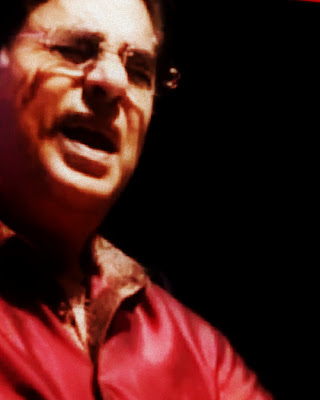 |
| Padma Bhushan Jagjit Singh (Ghazal Singer) |
Every Word does not
find a Poem;
Every Syllable does not
find an Expression;
Every Note does not
find a Song;
Every Song does not
reach the Heart......
The Singer who touched the heart
leaving a lingering sensation,
A want to hold it on forever,
escaped this mortal world..
10th October 2011, Jagjit Singh left us all behind his hauntingly mellow soulful music. Hailed as the reviver of Indian Ghazal, Jagjit Singhji made Ghazal, otherwise limited to aristocracy, a household music.
Born on 8th Febrauary 1941 in Shriganganagar in the State of Rajasthan, India , Jagjit Singhji started his Musical journey at an early age of 12. First under Pandit Chaganlal Sharma and later under Ustad Jammal Khan of Sainia Gharana. Jagjit Singhji learnt all forms of Indian Classical Music - Khayal, Thumri and Dhrapad. He was joined in this musical journey by his wife Chitra Singh in 1969.
An amalgamation of Western and Indian instruments as a backdrop, a new form of Ghazal was presented to the world with the release of the album ‘The Unforgettables’ in 1976 by the Duo.
There was no looking back. The pace, mood and tone put the ‘near extinct’ Ghazal Gayaki on full throttle ! Ecstaties, A Sound Affair, Passions, Beyond Time, Someone Somewhere was the milestones of the Duo’s journey together.
The tragedies of life put an end to the dual performance when Chitra Singh stopped singing after the tragic loss of their son. The journey did not end. Jagjit Singhji braved and continued with the silent support. Hope, In Search, Insight, Mirage, Visions, Kahkashan, Chirag, Sajda, Marasim, Aaeena kept the music lovers enchanted. There was also soothing devotional albums - Hey Ram, Hare Krishna, Saanwara Krishna and Gurbani.

To keep the listeners en-captivated for more than four decades is near to impossible. As the new generations replace the old ones, the interest changes & focus shifts. This is true for every aspect of life - Art, Science and Food too ! Dynamism is the mantra. This was the mantra of Jagjit Singhji’s Music too. A marginalised art form was made appealing to one and all by blending the Old with the New. Use of Western contemporary instruments and modern technology, simple worded lyrics - easily understood by the common man, presented with a fresh rendition - a departure from the prevalent classical & semi-classical based rendition in the God gifted tender, hauntingly mellow voice put the Ghazal on top of the Music charts.
The essence of Jagjit Singhji’s Ghazal renderings echos in Khalil Gibran’s couplet -
“ O Music, In your depths we deposit our hearts and souls.
Thou hast taught us to see with our ears and hear with our hearts.”
The social recognition followed with the Padma Bhushan in 2003, the third highest civilian award given by the Government of India.
As, no two violin sound the same, the combination of the versatility, voice tone, lyrical rendition in one body and soul cannot be made again.
Thanks to the ever inquisite human nature and the relentless innovators of modern technology - the Maestros of the past can be felt without any space and time constraint.
The lines from the Ghazal - ‘Kisi Ranjish ko hawa do ki mein jindha ho abhi” from the album “The Unforgettables” will forever echo and mesmerise our hearts.
| The Parva Picks |
|---|
| Kisi Ranjish Ko Hawa Do: Chitra Singh |
मुझको अहसास दिला दो कि मैं ज़िंदा हूँ अभी
मेरे रुकने से मेरी साँस भी रुक जाएँगी
फ़ासले और बढ़ा दो कि मैं ज़िंदा हूँ अभी
ज़हर पीने की तो आदत थानेवालों
अब कोई और दवा दो कि मैं जभी
चलती राहों में यूँ ही आँख लगी हिर’
भीड़ लोगों की हटा दो कि मैं ज़िंदा हूँ अभी
The journey of Ghazal
The origin of Ghazal can be traced back to Qasida prevalent in Arabia in 6th-7th century. In the 10th century it was brought to Iran where it was nurtured and from there spread to different parts of the world.It continues to be written, recited and sung in the Middle East, Northern Africa, and Indian sub continent.
Ghazal in Arabia means ‘discourse’ or ‘talking to women’. The word is pronounced as ‘ghu-zzle’. The structure of Ghazal has a series of independently themed couplets called Sher that has a consistent meter and rhyme scheme. The main feature of the Ghazal is the repetition of a word or phrase that first appears in both lines of the first couplet. This is called Radif. Another interesting feature is the customary practise of the poet putting his/her own name or pen name in the final couplet. This is called Takhallus.
The Ghazal traditionally has one subject - Love.The influence of Islamic Mysticism on the subject of love is another aspect which can be noticed in the themes. Here the concept of Sufism can be seen, which gives a spiritual context to the poetry. The scholars interpret them as Divine love (ishq-e-haqiqi) or Earthly love (ishq-e-majazi).
The Ghazal writing attained popularity during the 10th-13th century. Rumi (1207-1273), Hafiz ( 1326-1390) were one of the leading torch bearers of Ghazal which had the Sufi flavour.
The Ghazal was brought to the Indian sub continent by the Islamic rulers in the 12th century. The credit of Ghazal popularity is given to Amir Khusro (1253-1325) in North India. But Deccan in South India is the real home in early stages. It was nurtured in the courts of Golconda and Bijapur. Wali Deccany ( 1667-1707) is called the Chaucer of Urdu Poetry. Wali carried the beauty and richness of Urdu poetry to Delhi in 1700 and paved way for the synthesizing of North and South streams.The Persian language paved way to Urdu.
In the 18th - 19th century the Ghazal in India became associated with high culture, courtesans and the poems were frequently accompanied by music or performed. Mirza Ghalib ( 1797-1869) was the great Maestro of this era.
Today, Ghazal in India has a mass following as a popular music form. Ghazal is not limited to Middle East and the Indian sub continent, it has gained followings in the West too. It has been successfully adopted in English language. The couplet from Rumi very beautifully expresses the essence of Ghazal Music -
Don’t worry about saving these songs!
And if one of our instruments breaks,
it doesn’t matter.
We have fallen into the place
where everything is Music.
The origin of Ghazal can be traced back to Qasida prevalent in Arabia in 6th-7th century. In the 10th century it was brought to Iran where it was nurtured and from there spread to different parts of the world.It continues to be written, recited and sung in the Middle East, Northern Africa, and Indian sub continent.
Ghazal in Arabia means ‘discourse’ or ‘talking to women’. The word is pronounced as ‘ghu-zzle’. The structure of Ghazal has a series of independently themed couplets called Sher that has a consistent meter and rhyme scheme. The main feature of the Ghazal is the repetition of a word or phrase that first appears in both lines of the first couplet. This is called Radif. Another interesting feature is the customary practise of the poet putting his/her own name or pen name in the final couplet. This is called Takhallus.
The Ghazal traditionally has one subject - Love.The influence of Islamic Mysticism on the subject of love is another aspect which can be noticed in the themes. Here the concept of Sufism can be seen, which gives a spiritual context to the poetry. The scholars interpret them as Divine love (ishq-e-haqiqi) or Earthly love (ishq-e-majazi).
The Ghazal writing attained popularity during the 10th-13th century. Rumi (1207-1273), Hafiz ( 1326-1390) were one of the leading torch bearers of Ghazal which had the Sufi flavour.
The Ghazal was brought to the Indian sub continent by the Islamic rulers in the 12th century. The credit of Ghazal popularity is given to Amir Khusro (1253-1325) in North India. But Deccan in South India is the real home in early stages. It was nurtured in the courts of Golconda and Bijapur. Wali Deccany ( 1667-1707) is called the Chaucer of Urdu Poetry. Wali carried the beauty and richness of Urdu poetry to Delhi in 1700 and paved way for the synthesizing of North and South streams.The Persian language paved way to Urdu.
In the 18th - 19th century the Ghazal in India became associated with high culture, courtesans and the poems were frequently accompanied by music or performed. Mirza Ghalib ( 1797-1869) was the great Maestro of this era.
Today, Ghazal in India has a mass following as a popular music form. Ghazal is not limited to Middle East and the Indian sub continent, it has gained followings in the West too. It has been successfully adopted in English language. The couplet from Rumi very beautifully expresses the essence of Ghazal Music -
Don’t worry about saving these songs!
And if one of our instruments breaks,
it doesn’t matter.
We have fallen into the place
where everything is Music.
| Remembering Jagjit Singh | |

